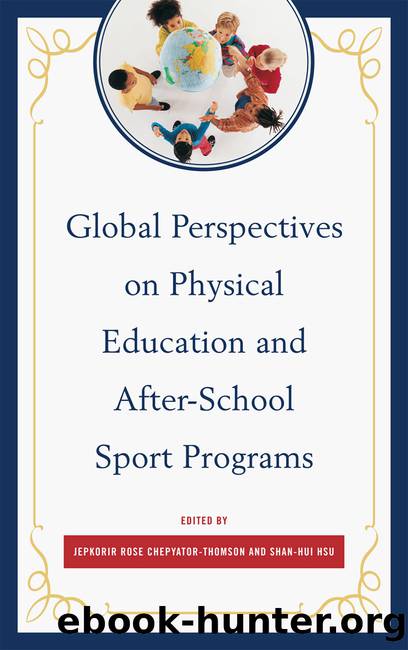Global Perspectives on Physical Education and after-School Sport Programs by Chepyator-Thomson Jepkorir Rose;Hsu Shan-Hui;

Author:Chepyator-Thomson, Jepkorir Rose;Hsu, Shan-Hui;
Language: eng
Format: epub
ISBN: 9780761861188
Publisher: University Press of America, Incorporated
Unfortunately, extreme pressure to succeed academically and intense pressure to be admitted to the prestigious university result in high rates of an attempted suicide and/or completed suicide among adolescents in South Korea. âStudents are physically and mentally over-strained. Youth suicides attributed to the stress of the entrance examination have been increasingâ (Kim, 1999, pp. 58-59). Both parents and students complain that preparing for National University Entrance Examination is like hell, and the phrase is well known in South Korea and fairly well represents the value of academic achievement: âSa-Dang-Oh-Rak,âwhich is translated as four hours of sleep will succeed and five hours of sleep will fail. That is, a student who has four hours of sleep and spends the rest of the time studying will likely pass the National University Entrance Examination, while a student who sleeps five hours a night will likely fail the examination.
After-School Programs and Emerging Issues in Physical Activity Participation
The low participation rate in out-of-school physical activities and sports among South Korean students may have been reported for the following reasons: (1) lack of youth sports programs and/or limited access to the community-based sporting facilities; (2) emphasis on preparation for the college-entrance examination throughout the school years; and (3) internet accessibility and sedentary lifestyle.
In 2000, the [South] Korean government initiated its 5 school days policy (i.e., no school on Saturday), giving rise to considerable conflicts among stakeholders, especially parents. To minimize such conflicts, the [South] Korean government began more actively supporting after-school activities and eventually the 5 school days policy spread from the major cities to areas across the nation (Won & Han, 2010, p. 630)
Download
This site does not store any files on its server. We only index and link to content provided by other sites. Please contact the content providers to delete copyright contents if any and email us, we'll remove relevant links or contents immediately.
The Art of Coaching Workbook by Elena Aguilar(51161)
Trainspotting by Irvine Welsh(21643)
The Secret History by Donna Tartt(19052)
Twilight of the Idols With the Antichrist and Ecce Homo by Friedrich Nietzsche(18622)
All the Missing Girls by Megan Miranda(15957)
Cat's cradle by Kurt Vonnegut(15335)
Ready Player One by Cline Ernest(14644)
Talking to Strangers by Malcolm Gladwell(13347)
Fangirl by Rainbow Rowell(9229)
The remains of the day by Kazuo Ishiguro(8975)
The Compound Effect by Darren Hardy(8948)
Thirteen Reasons Why by Jay Asher(8893)
Tools of Titans by Timothy Ferriss(8365)
Periodization Training for Sports by Tudor Bompa(8254)
Wonder by R. J. Palacio(8097)
The Lover by Duras Marguerite(7893)
A Court of Wings and Ruin by Sarah J. Maas(7821)
Change Your Questions, Change Your Life by Marilee Adams(7759)
The Complete Stick Figure Physics Tutorials by Allen Sarah(7363)
